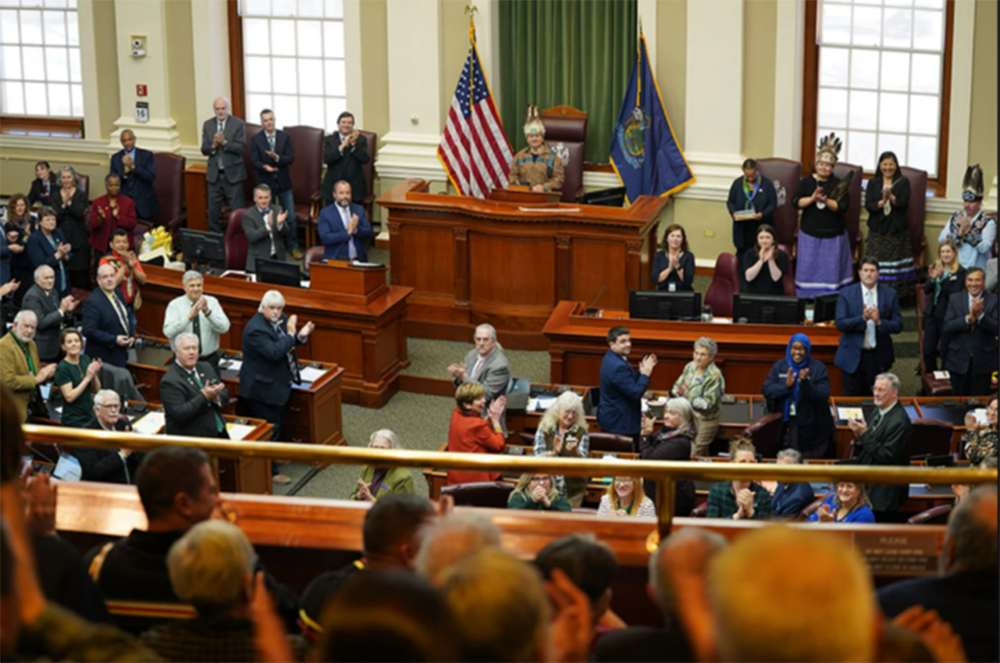On Thursday, March 16, the chiefs of the Wabanaki nations gathered before the Maine House of Representatives chamber to present a State of the Tribes address. This was the first time in Maine’s history that all five Wabanaki chiefs were present to deliver the address and the first time since 2002 that the Wabanaki nations presented an address to the state legislature.
The tribes’ main theme of the address was to renew calls for tribal sovereignty within the state of Maine, with Passamaquoddy Tribe at Motahkomikuk Chief William Nicholas exclaiming, “We must unite together!”
The Wabanaki chiefs shared their collective wish for sovereignty over tribal lands. Some of the powers that would come with this status would allow them to enforce rules on fishing and hunting, as well as water usage.
There are currently 574 officially recognized Indigenous tribes located throughout the contiguous 48 states and Alaska. Chief Edward Peter-Paul of the Aroostook Band of Micmacs called for the Wabanaki nations to receive the same status. “We are not asking for handouts. We are asking to self-determine our destiny,” he said.
The state of Maine currently adheres to the Maine Indian Claims Settlement Act that was signed by President Jimmy Carter in 1980. This act allowed tribes to be compensated for the loss of their land. However, the tribes see its implications as a hindrance to their development, as they are left out of benefits provided to other Indigenous communities by the federal government.
“My nation survives on federal grants and grants alone. We don’t have economic development, we don’t have a way to generate revenue on our tribal lands to better our community, because we are so restricted by the state,” Peter-Paul said.
Third-year University of Maine student Elizabeth Philips offered her perspective on the difficult situation tribes in Maine are facing.
“I come from a long line of family in the Wabanaki nations. My father was chief of the Aroostook Band of Micmacs when I was growing up, and my mother is Penobscot. It is incredibly frustrating knowing that Maine tribes are not receiving the same rights as tribes across the country, and it would only make sense that the Wabanaki nations received the same treatment,” Philips said.
Maine Congressman Jared Golden, U.S. representative for Maine’s 2nd congressional district, was in attendance at the address and has been a strong advocate for improving legislation regarding Maine’s tribes during his time in Washington. Phillips commended Congressman Golden for his efforts to achieve equality for Maine’s tribes. Governor Janet Mills was not present for the address.
Also willing to comment on the address, particularly pertaining to unique struggles faced by the Micmac Nation, was Philips’ father, former Aroostook Band of Micmacs Chief William Phillips.
“After hearing the chiefs make their statements, I was disappointed that there was no mention that the Mikmaq Nation was not part of the 1980 settlement (Maine Indian Claims Settlement Act). The Mikmaq Settlement Act was passed in 1981 and didn’t have the implementing act attached as law,” William Philips said.
William Phillips explained how an agreement between the state of Maine and the Micmac tribe was never officially made at this time and that the tribe had been recognized as a sovereign nation before the state appealed against its status and won by split decision.
“The two judges who ruled against the Mikmaqs actually broke federal Indian law. A tribe cannot lose their rights unless explicitly doing so in written agreement…There will be a day when another case is heard in court, and the Mikmaq Tribe will win,” William Philips stated.
“[Maine tribes need] for state government to break decisively from the past and join the era of self-determination for tribal nations that has proven so successful throughout the rest of the country. We are capable of self-governance and should be treated as partners rather than threats to the future of this state,” Chief Kirk Francis of the Penobscot Nation said.








